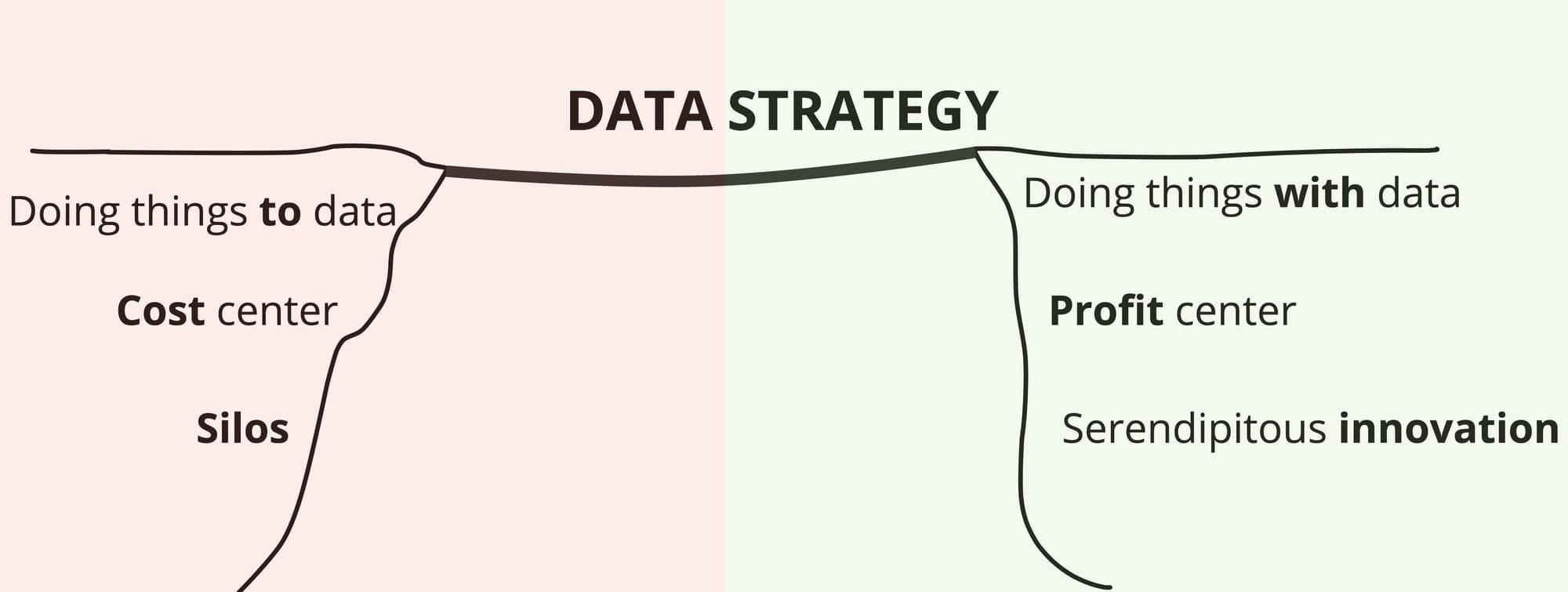Data strategy: why should you care?

The idea that has been around for so long and was marketed so badly is experiencing a renaissance. A number of shifting circumstances invite executives to completely rethink the role of data in the organisation. From a bureaucratic necessity you need to fulfil for the upcoming audit—to a major resource allowing your business to stay relevant and compete in the modern economy.
Here are the key paradigm shifts that today bring data strategy to the central stage.
From defensive to offensive
Conventionally, the data strategy guidance focused on what you can do to data. There are not that many things really. Same old boring: clean, validate, control and protect. A defensive approach. Today, the most successful businesses focus on what they can do with data. An offensive. Suddenly, the spectrum of possibilities becomes much more exciting. You can use data to reduce operational costs by automating expensive manual work. You can attract new customers, serve them better with personalised experience, and eventually prevent unnecessary churn. You can optimise inventory levels, predict demand, and streamline logistic operations. The list goes on and on. For every industry and for every unique business with its unique set strengths and weaknesses.
From cost to profit center
Traditionally, data has been treated as a cost center. This led to minimal investment and a general lack of attention that usually follows a business operation with a positive impact on the bottom line. A modern data strategy flips the traditional mindset to treating data as a source of value creation. One way to do it is to use data to improve the existing product offering.
My favourite example in this category is the earnings impact of a machine learning model that increases revenue by “mere” 2%, but given the price-tag of the problem it is solving—the profit gets measured in millions.
Another good illustration is a data product popular among B2B businesses—offering the insights into its unique proprietary data to either existing customers as a premium service or to its industry partners. This can grow the profit margin by 10% virtually overnight, and that without any new operations, hires, or customer acquisition. Show me a CFO who wouldn't get excited.
Finally, companies that find ways to make data and low-effort automation tools accessible to their employees benefit from serendipitous innovation. People are your single most valuable asset. Empower them, give them the tools, get out of their way, and prepare to be amazed by the positive impact their ideas can have on your business.
Perfect excuse to break down silos and encourage innovation
While implementing change and getting departments to talk in an organisation is notoriously hard, data projects is a preventive care that teaches people to work together and proactively optimise established processes. I’ve been through an organisation-wide data project a few times and this became one of my favourite experiences.
It usually starts with an idea, which can come from the top, the bottom, or anywhere in between. Whoever becomes a champion for that idea soon enough realizes that they need some sort of data for their idea to work.
They reach out to the data department, and after a short while, a data engineer—it is always a data engineer, as they know the company's data plumbing the best—starts being a detective trying to cover the white spots in what the business thought was its data landscape. The crime scene is the company itself. So they talk to suspects in different departments. Their talks are refreshingly factual, as they are after a very specific thing—data.
People from other departments get excited about the idea that someone decided to pay such genuine attention to what they've been doing all along and want to know all about it. So they share. They share generously. After some interviewing, brainstorming, double-checking, and diagramming sessions, the data engineer and their new friends muster a plan on how to put the missing pieces together—maybe with minor adjustments to how things are done here and there.
The party starts getting bigger. They invite the initial champion, usually coming from the business side, the management who is to benefit from the change, and the senior management. The initiative is doomed to success, the business benefits, and the best part—people got to know each other, discovered new things about the context in which they work, and successfully implemented a change without even trying.
Summary
In today's economy, the question should not be "Why should you care about data strategy?", but rather "Why shouldn’t you?". A modern data strategy is not just a bureaucratic necessity. It’s one of the cards up your sleeve that can help you drive innovation, profit, and organisational transformation.
By taking an offensive approach and treating data as a profit centre rather than a cost centre, you can unlock new revenue streams, optimise operations, and deliver personalised customer experiences. Moreover, data projects are a catalyst for breaking down organisational silos, getting people to talk, and encouraging employees at all levels to contribute their insights and ideas.
